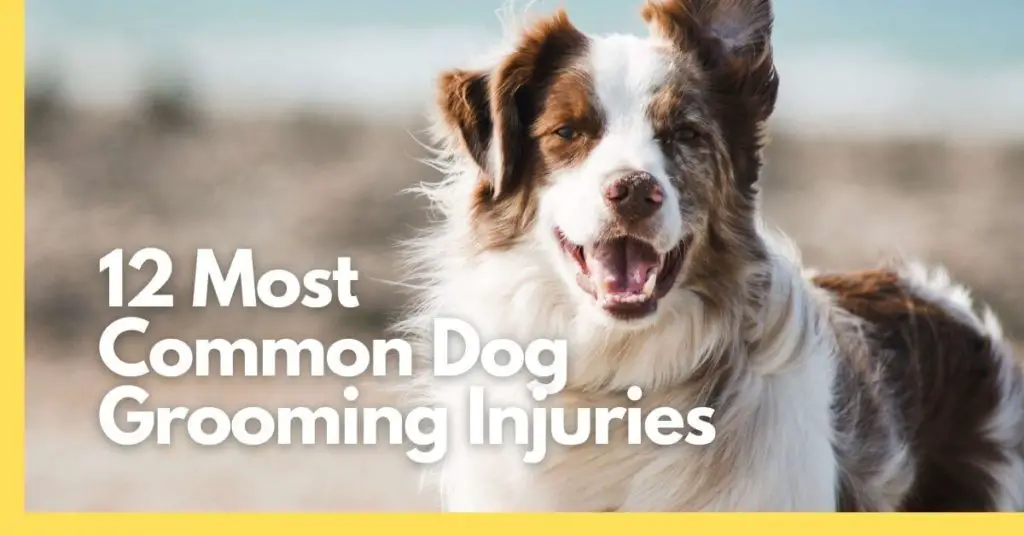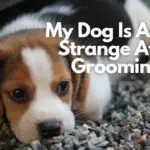“My dog got nicked by a groomer!”
Is your dog acting strange after grooming? You may or may not have experienced any dog grooming injuries previously but they are more common than you think.
Before you decide to sue your dog groomer, having a thorough understanding of these top dog grooming complaints will come in handy for pet owners in the event of these unforeseen circumstances.
In this article, you will learn about:
- Top 12 dog grooming injuries
- 10 Ways to avoid dog grooming injuries
- Signs of a bad groomer
- And more…

12 Top Dog Grooming Injuries
- Razor Burn
- Brush Burn
- Scrapes and Cuts
- Nail Injuries
- Bacterial and Yeast Infection
- Irritation in the Private Parts
- Dew Claw Injuries
- Hematomas
- Tongue Injury
- Ear Injury
- Eyes Injury
- Anal Gland Irritation
We’ll go through each one of them in detail below:
1. Razor Burn
According to PetMD, dogs should be groomed on a periodic basis to keep their skin and coat in good shape.
In case you notice your dog behaving uncomfortably after a grooming session, the first reason you should suspect is razor burn.
Razor burns can occur due to two reasons:
- If a dull blade is used (or)
- When a dog’s fur is shaved too close to his or her skin.
So if your pet is suffering from irritations post-shaving, try patting the affected area with a moist, cool cloth until it is dry. Or apply some coconut oil for dog razor burn to heal the wounds faster.
It is best to take your fluffy friend to the veterinarian if you notice blood from the injuries.
Also read: Can I put Sudocrem on my dogs bum?
2. Brush Burn
Brushing of your dog’s hair is an essential part of any dog grooming session. Who doesn’t love having their dog look neater and fluffier?
But what goes unnoticed is that over brushing at the same area can cause your pet to develop abrasion on their skin. This is especially so for dogs with sensitive skin. Over-brushing can also happen at home when pet parents get a little too zealous at grooming their dog.
This can happen more frequently than you imagine as you won’t realize that you are hurting your dog until redness or skin lesions develop. Your dog may whimper at the stroke of your brushes and may even lick or scratch their skin to soothe themselves. !
According to the AKC, some dogs may dislike being brushed because they have had unpleasant experiences of painful grooming in the past. So, here are a few points to assist you to brush your dog without causing undue stress:
- Create a relaxing atmosphere and place your dog on top of a soft place.
- Begin brushing in a steady and gentle motion. Make sure the procedure isn’t rushed.
- Try short brushing sessions with rests in between to avoid upsetting your pets.
- Brush them tenderly to the end and praise them in the meantime.
- Until the end, brush them softly and compliment them meanwhile.
Make sure to use a high-quality brush, such as No products found., No products found., or No products found. dog brushes.
3. Scrapes And Cuts
Dogs literally have no worry in the world. These creatures, who spend their days enjoying the moment, do not sit well during grooming treatments. Some get nervous while some just can’t sit still!
When grooming, dogs can incur tiny scrapes and scabs on dog after grooming as a result of their constant movement. Though it is nearly impossible to prevent dogs from moving in between cuts, you can take the following precautions to reduce the risks of nicking their skin:
- Take your dog to the groomer when they are quite young, as early as 12 weeks old, frequently so that they can get more comfortable with the groomers.
- Notify the groomers if your pet has any moles or wounds so they can be extra cautious when grooming those areas.
4. Nail Injuries
As many dogs may hate clipping their nails, trimmed nails are the signs of your pet being healthy. Unfortunately, dogs do not understand this and may refuse to cooperate during nail grooming.
If you don’t take care of your pet’s nails, it might lead to serious health problems, such as the ones listed below:
A. Broken Nails
Overgrown nails in dogs can break off dangerously short or split, exposing the blood vessel, resulting in broken nails. Broken nails are extremely painful and require quick attention from a veterinarian.
B. Quicked Nails
Since each nail contains a blood vessel, cutting them too short might cause them to bleed. Nail trimming on a regular basis will assist these blood vessels to shrink, making each nail cut shorter and easier for your dog.
C. Overgrown Nails
Nails do not stop growing in dogs. If left untrimmed, they will collect bacteria and create diseases in the pet, which is why they must be trimmed regularly. Your dog may limp or be more sensitive now that his excessive nails have been removed and he can walk normally on their tender paws.
Nail grooming can be done at home or at the groomers. One thing to keep in mind when clipping your dog’s nails is to keep them docile.
Let’s take a look at some of Dr. Teresa Manucy, DVM’s suggestions for peacefully trimming dog nails:
- Keep your dog in a tranquil area, free from distractions.
- Hold your pet on your lap and proceed to start trimming.
- Since dogs can start thrashing around by being overly cautious on the sight of clippers, make sure to hold their paws gently.
- Push down softly on the paw pad to extend the nail forward.
- When your dog is relaxed, clip straight across the tip of the nail.
- Repeat the process till you finish trimming all their nails,
After you’ve finished trimming, don’t forget to reward your dog with tasty treats for sticking it out until the end.
Also, make sure to use quality nail clippers to make the process here. Some of the brands we recommend include No products found., No products found., and No products found..
5. Bacterial And Yeast Infection
It is normal if you ever see your dog using its feet to scratch their ears. But are they doing it frequently? Then it is a matter of concern.
Dogs are susceptible to all types of infections. Bacterial and yeast infections, which thrive in your pet’s most areas, are one of the most common. Poor grooming is one of the common reasons for bacterial and yeast infection in dogs.
Since yeast infection causes irritation to dogs, they scratch the infected regions to ease the itch. If the infection is not treated quickly, it can spread to other areas of the body via the feet, which is a major problem.
Antifungal drops, sprays, or ointments, according to Dr. Leigh Burkett, DVM, are the best treatment for yeast and bacterial infections. To avoid yeast infections, don’t let your dogs damp for extended periods of time and dry them as soon as possible.
6. Irritation In The Private Parts
Leaving the fur of dogs untrimmed for long will cause matting. Matting occurs when your pet’s fur becomes twisted into knots as a result of being overly long.
Matted furs are quite unpleasant for dogs, particularly in the genital areas where the hair is not well-groomed. As a result, pet parents must make sure that the fur in genital regions is appropriately cut during grooming sessions.
However, grooming the private areas of your dog with tools like eclectic clippers, or scissors can lead to irritation in those spots.
If your pet becomes uncomfortable after grooming and licks the area excessively, it is best to take them to the doctor to have the discomfort treated.
7. Dew Claws Injuries
Dewclaws can be found in the inner part of doglegs. Nails grow in this part too, but they have a subtle appearance. Despite their subtle appearance, these nails can cause discomfort to the pet, just like how ingrown nails disturb us.
Trimming dewclaws can be quite tricky since one wrong move can cause bleeding.
So, in these cases, be sure you are trimming just a little bit off at a time. Make sure to file your dog’s dew claws as well as all of their other claws after trimming them to get any sharp edges left behind.
In the event of a wound, a bandage can be used to halt the bleeding in dog.
8. Physical Injuries
One of the ways to calm a frantic dog to comply with the grooming session is through treats and toys.
But what if your dog is so nervous that it isn’t swayed by food at the groomer’s?
Then be ready for loud wailing noises and thrashing movements.
This is where the next problem comes if your dog is not obedient enough and is frantic throughout the session, there’s a possibility they’ll sustain injuries from tumbling off the table or being scratched by the trimmers.
Groomers frequently encounter this problem, and while most of the time the pup’s behavior is brought under control, there are times when things can get out of hand.
Make sure to calm your pup even before the session starts and hold them in place to avoid them from falling.
If you find your dog walking strangely after a grooming session, be sure to check it for any physical injuries before dismissing it as something normal.
9. Tongue Injury
Dogs have this cute habit of showing their tongue whenever they are happy. However, this habit can be quite dangerous during grooming sessions.
Though rare, when grooming a pet’s face, there are slight chances of the tongue getting in the way and getting hurt.
Usually, the wounds are as minor as scratches or nicks; it still is best to get it treated right away.
If it’s a minor wound, you will have nothing to worry about since the bleeding will stop in a while, but it is better to take your pet to the vet if it’s a severe condition.
10. Ear Injury
Grooming does not end with trimming the obvious long hairs from your pet dog; it also means trimming hairs from the small areas too.
To prevent ear hair from getting matted, the groomer pulls the hair out of the ears. Since it is pulling out, not trimming, dogs will definitely feel severe discomfort after the session.
Ear trimming can be quite daunting for the animal and cause it to feel sore and scratch the ear area after the session. But if the pet appears to act out of the ordinary like excessive headshaking, take a visit to the vet.
11. Eyes Injury
Dog’s eyes are extremely sensitive. Watery eyes, tear streaks, or eye goop/crust can result from even the tiniest foreign item entering the eye.
According to PetMD, eye injuries are pretty normal, and following several precautions will help the injuries fade away before your pet scratching it makes it worse:
- Soak a cloth in warm, salty water.
- Wrap the fabric around your dog’s head, concealing their eyes.
- Remove the fabric after some time.
If your pet continuously squints its eye out of irritation, the best choice is to take it to the vet.
To prevent eye infections and injuries in your dear dog, you can periodically use eye drops like No products found. and No products found..
12. Anal Gland Irritation
During a grooming procedure, every area of the dog is checked and cleaned, including the anal glands.
Groomers will apply pressure on the outer to push the fluid out the anal glands. This step is followed in every grooming session.
However, when too much pressure is applied, there are chances of your dog getting its anal gland ruptured.
According to Dr. Michael Kearley, DVM, if your dog is scooting after a grooming treatment, it’s possible that their anal gland was hurt during the grooming session,
Examine your dog’s nether regions for swelling and take them to the vet as soon as possible.
Also Read: Best Dog Foods for Anal Gland Issues
10 Simple Ways To Avoid Dog Grooming Injuries
Whether you groom your dog on your own or through the groomer, there are a few points to look out for in order to avoid injuries, alleviate suffering, and make the grooming procedure more relaxing for your fluffy companions. They are as follows:
- Consider your dog’s illness and injuries before starting the session.
- Sift your hand through your dog’s skin before diving into the session to see if they have any wounds, cuts, or other injuries.
- Examine your dog’s ears for signs of infection. This is an important step because it can spread to other parts of your body if the infection is not taken care of at once.
- Make sure the place at which you will be grooming your pet is tranquil, with soft music void of distractions.
- Take a pause between grooming sessions by complimenting or brushing your pets.
- Since your dog can get feisty in the middle, keep them in control by showing them their favorite treats.
- If you feel your dog getting anxiety or fear, soothe them with kind words and pats.
- Take breaks in the middle to calm your pets.
- When grooming their eye area, take extra caution.
- When blow-drying your pet after the session, make sure the dryer is set to low heat settings since your pet may be terrified of too much heat.
Finally, reward your pet with treats, and also don’t forget to give them their well-deserved pats for enduring the session till the end.

